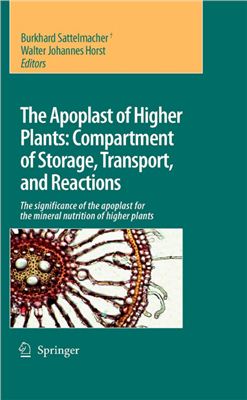Springer, 2007, 457 pages
From the viewpoint of plant mineral nutrition, the apoplast is of interest in many respects: nutrients do not simply pass through the apoplast before being taken up into the symplast, but they may also be adsorbed to cell-wall components, complexed, and oxidized/reduced which may be of significance
for nutrient acquisition, nutrient function and tolerance of deficiency and toxicity stresses. Also the regulation of long-distance ion transport in the apoplast, the xylem, is not understood. However, this process is of great significance for the understanding of deficiency and toxicity symptoms.
The book summarizes the experimental work conducted during a transdisciplinary research programme funded for 6 years by the German Research Foundation (DFG) within the Priority Research Project SPP
717. This financial support is highly acknowledged. In their contributions, the authors from different disciplines not only report original research but also review the state of knowledge in their particular research fields: nutrient acquisition, short and long distance (xylem) transport, tolerance of nutrient deficiencies and mineral toxicities, and the role of micro-organisms colonizing the apoplast. Introductory remarks are written to each of the sections by inteationally highly recognized scientists in their research areas.
From the viewpoint of plant mineral nutrition, the apoplast is of interest in many respects: nutrients do not simply pass through the apoplast before being taken up into the symplast, but they may also be adsorbed to cell-wall components, complexed, and oxidized/reduced which may be of significance
for nutrient acquisition, nutrient function and tolerance of deficiency and toxicity stresses. Also the regulation of long-distance ion transport in the apoplast, the xylem, is not understood. However, this process is of great significance for the understanding of deficiency and toxicity symptoms.
The book summarizes the experimental work conducted during a transdisciplinary research programme funded for 6 years by the German Research Foundation (DFG) within the Priority Research Project SPP
717. This financial support is highly acknowledged. In their contributions, the authors from different disciplines not only report original research but also review the state of knowledge in their particular research fields: nutrient acquisition, short and long distance (xylem) transport, tolerance of nutrient deficiencies and mineral toxicities, and the role of micro-organisms colonizing the apoplast. Introductory remarks are written to each of the sections by inteationally highly recognized scientists in their research areas.

